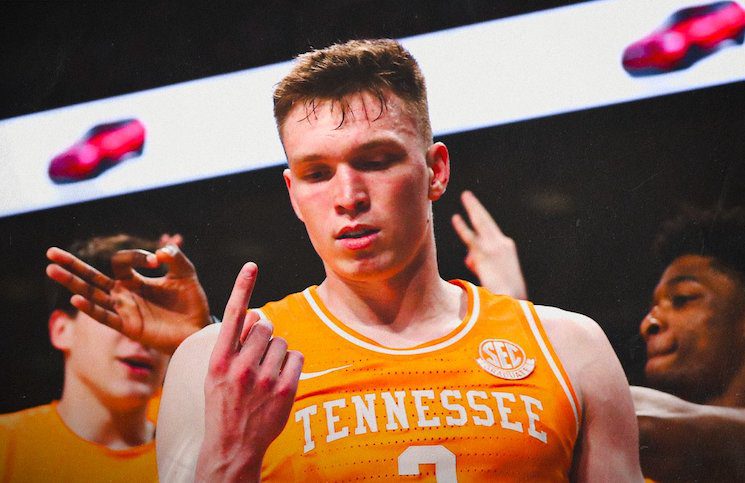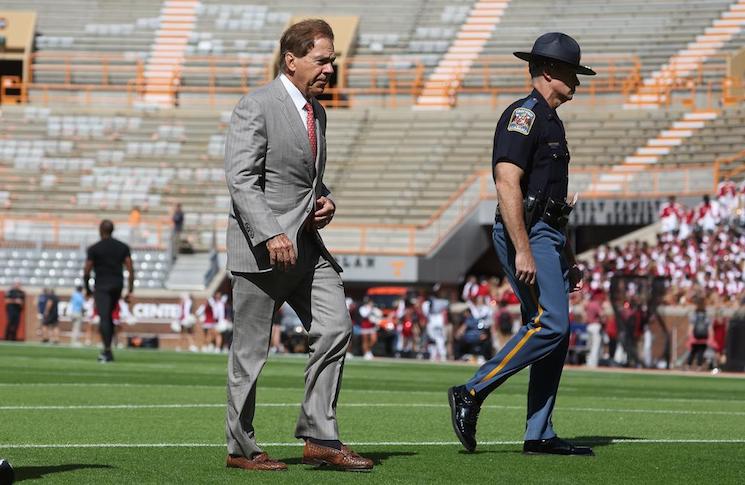
Sunday night through Monday night were a stressful 24 hours for Vol fans. And it wasn’t easy for Rick Barnes, either.
Tennessee’s head coach in men’s basketball deliberated between accepting a lucrative offer to become the next head coach at UCLA or staying with the Vols with a renewed offer from UT. Reports first surfaced on Sunday night that Barnes was a “serious” candidate for UCLA’s opening, and the more time dragged on, the more it appeared that the move to Los Angeles could happen for Barnes.
In the end, however, Barnes decided to stay.
It was officially announced by Tennessee on late Monday night during halftime of the NCAA Tournament Championship Game that Barnes accepted UT’s new contract offer to him and would stay with the Vols. UCLA then turned their attention to Cincinnati’s Mick Cronin, and the two came to an agreement on Tuesday.
But why did Barnes listen to UCLA’s offer? What was so appealing about the Bruins that made Barnes consider leaving the place he called home for the last four years?’
In an interview with Chris Low of ESPN, Barnes detailed why he was intrigued by UCLA and ultimately why he elected to stay in Tennessee.
“It had nothing to do with Tennessee,” Barnes told Low. “I’ve been here for four years and could never, ever say enough about the way this university, this state, and the Vol Nation has treated me. It was simply the lure of UCLA basketball. I remember all those great teams and great players going back to Lucius Allen, Tommy Curtis, Lew Alcindor, and Bill Walton, and I had a chance to spend quality time with Coach Wooden in his later years when I was able to go by and meet with him at his condo and go to lunch with him.
“So the way I look at UCLA basketball might be different than some people look at it now. But, still, in my mind, the UCLA basketball job was something I thought I had to look at.”

Barnes was born in 1954, and his formative years as a student of the game would’ve been near the height of UCLA’s power. John Wooden won his first championship with the Bruins when Barnes was eight, and UCLA’s historic run of seven-straight NCAA titles would’ve come while Barnes was in grade school.
The beginning of Barnes’ coaching career came after Wooden’s time ended at UCLA, but the mystique of what the Bruins did and that job was still prevalent even when Barnes took over at George Mason for his first head coaching job in 1987.
Lately, though, UCLA hasn’t been what it once was.
After Ben Howland took the Bruins to three-straight Final Four appearances in 2006, 2007, and 2008, UCLA has failed to make it beyond the Sweet Sixteen. In fact, the Bruins have missed making the NCAA Tournament four times in the past 10 seasons.
The allure of trying to revitalize a blue blood program was strong for Barnes. Ultimately, though, he decided to stay with Tennessee after UT came back and countered UCLA’s hefty offer.
“Tennessee made it very clear to me what the basketball program has meant to the university, and while they know this game can be up and down, they also made it clear that they wanted me to be the coach here and were willing to give me everything we need to sustain it,” Barnes explained. “My goal is to make it even better, and I can never thank them enough for the way they handled everything.”
According to ESPN, Barnes’ new deal at Tennessee will pay him over $4 million next season and could get close to $6 million annually by the end of the contract. His new deal also includes a larger salary pool for his assistants as well as multi-year contracts for some of his staff.
The larger pool of money for assistants seemed like an especially large point of interest for Barnes according to multiple reports during UCLA’s courtship. Two years ago, Barnes pulled money out of his own salary to give assistant coach Desmond Oliver a raise that Barnes felt Oliver deserved even though UT told him at the time it “wasn’t in the budget” to give Oliver a raise.
That was two years ago under a completely different administration, though. Now, Barnes feels much more supported and encouraged.
Even with that new deal and new sense of support, the decision wasn’t an easy one for Barnes to make. So in very typical Barnes’ fashion, he turned to prayer to help make that choice.
“There was a lot of prayer that went into this, and I know a lot of people outside of our family that were doing a lot of praying,” Barnes stated. “I don’t think we have a God of confusion. I think He was absolutely going to make it clear, and in my mind He did that.”
Ultimately, Barnes and his family came to the decision to stay with Tennessee, and now the expectations will be raised. Tennessee’s 2018-19 season was a memorable one during the regular season as the Vols soared to No. 1 in the country and won a program record 19-straight games. But the postseason wasn’t as memorable, as Tennessee got blown out in the SEC Tournament Final by Auburn and fell to Purdue in overtime in the Sweet Sixteen.
But Barnes thinks the horizon is very bright in Knoxville, and he believes things can reach another level in the future.
“I believe here at the University of Tennessee, with the way our fan base has been since I’ve been here and the way we’ve gotten it going, that there’s no reason we can’t keep this thing going,” Barnes said,” but also we can take it to another level.”
You can read Chris Low’s full interview here.




One Response
Considering the parody of talent in Div 1 men’s NCAA basketball, and the fact that the tournament is a single-elimination system that does not ensure that the BEST team will WIN any particular game on any particular DAY win playing another good team, people make too big a deal about what happens to THEIR team in a season during the tournament, and basing hiring decisions or your coaches performance based solely on what happens after the second or third game into the tournament is a recipe for ruining the future of your program. This is not the same sport as it was in the 60s, 70s, 80s or even the 90s. Unlike the women’s game, it is very unlikely that any particular team will win the whole ball of wax in any particular year no matter how much they dominated during the season or how much talent any particular team has in relation to any other of the top 15 or so teams.
Considering that any particular team invited to the tournament has to lose only one game out of six up against one of the 67 other best teams chosen and the level of competition; it is very flippant to assume that any team would have a good chance of winning the title in any particular year, and that probability goes down every year as we get more parody.
Consider this…This year Duke beat the eventual national champion, not once, but twice this year including at UVA’s home court. Duke lost only a few games in the toughest conference this year; but Duke lost to Gonzaga who not only beat Duke but beat just about everyone else during the season, but then Gonzaga lost to UT on a neutral court. Our minds try to make sense of all of this and tell us that Duke or Gonzaga or TN should win it all, but TN beat UK and then UT turned around and lost to Auburn by 20 in the conference tournament championship the next day. The fact is that were many good teams; at least sixteen or so, that had a very good shot at winning any time they stepped on the court against any team in the nation. Once we entered the second week (sweet 16), all the games were super close and could have easily gone either way, which means that if YOUR team advanced, you had some luck and/or certain players stepped up just enough at the right time, and if your team LOST, then it means it would have taken only one or two plays to have gone slightly differently to be sent home. UVA, for instance, won their last three games to win the title by just a very thin margin and could have lost any of those three very, very easily; and if you look at a team like TN, it’s true that they barely won the first two games they were expected to easily win, but then turned around and went to overtime against an evenly-matched team (at least as the experts rank them) and lost in the overtime session to them, which was Purdue. Purdue took UVA down to the wire; then UVA went on to take on Auburn who took UVA once again down to the wire, which required three made free throws to win the game. UVA then had to win in overtime in the title game. So my point is that the idea that any team in this day and time, if you watched games this tournament season, should somehow be expected to win the title or go very deep into the tournament as if it’s your fantasy world, considering what we just witnessed, is a recipe for setting your team up for future failure. If your coaching staff is getting your team into the tournament consistently; they are getting good talent and developing that talent, and kids are staying or going pro, and you’re not getting knocked out in the first or second round every year, then you have a very successful program. That’s just the way it is, and to expect better is a way to mess your program up.